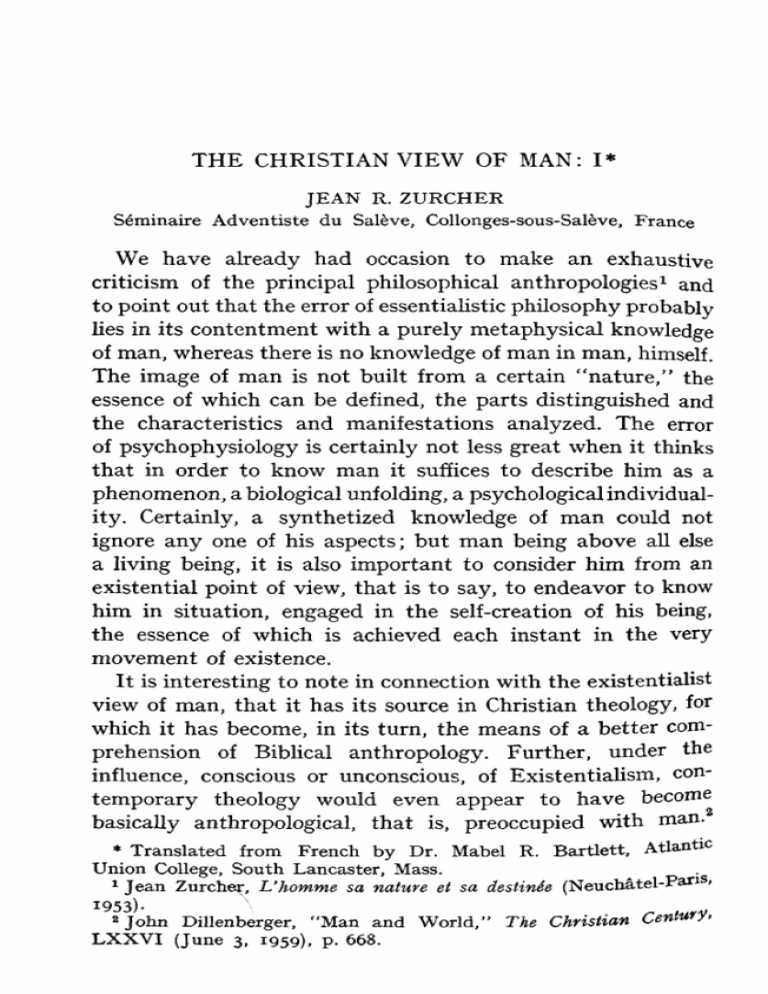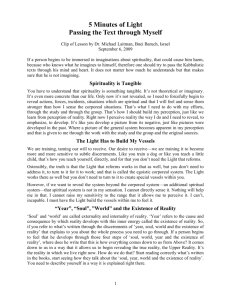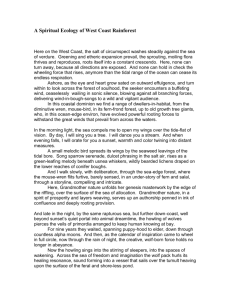THE CHRISTIAN VIEW OF MAN
advertisement

THE CHRISTIAN VIEW O F MAN : I * JEAN R. ZURCHER S6minaire Adventiste du Salhve, Collonges-sous-Sake, France We have already had occasion to make an exhaustive criticism of the principal philosophical anthropologiesl and to point out that the error of essentialistic philosophy probably lies in its contentment with a purely metaphysical knowledge of man, whereas there is no knowledge of man in man, himself. The image of man is not built from a certain "nature," the essence of which can be defined, the parts distinguished and the characteristics and manifestations analyzed. The error of psychophysiology is certainly not less great when it thinks that in order to know man it suffices to describe him as a phenomenon, a biological unfolding, a psychologicalindividuality. Certainly, a synthetized knowledge of man could not ignore any one of his aspects; but man being above all else a living being, it is also important to consider him from an existential point of view, that is to say, to endeavor to know him in situation, engaged in the self-creation of his being, the essence of which is achieved each instant in the very movement of existence. I t is interesting to note in connection with the existentialist view of man, that it has its source in Christian theology, for which it has become, in its turn, the means of a better cornprehension of Biblical anthropology. Further, under the influence, conscious or unconscious, of Existentialism, contemporary theology would even appear to have become basically anthropological, that is, preoccupied with mane2 * Translated from French by Dr. Mabel R. Bartlett, ~ t l a n ~ Union College, South Lancaster, Mass. Jean Zurcheq, L'homme sa nature et sa destink ( ~ e u c h i i t e l - p a ~ ~ ~ 1953)John Dillenberger, "Man and World," The Christian Century, LXXVI (June 3, 195g), p. 668. ' ' \ CHRISTIAN VIEW OF MAN I57 The many works published on this subject encourage us to make a detailed analysis of each of the anthropological notions contained in the Old and New Testaments. We propose, moreover, in this essay, to define first of all the particular meaning of Biblical monism, thus establishing the essential unity of man, according to the Bible. On the basis of this fundamental unity of the human being, it will be possible, then, to study its diverse structures. Finally, an examination of certain anthropological notions, more specifically Biblical, will make possible the delineation of the ethical and religious sense of the Christian view of man. For, in fact, is not man primarily a person in the context of the history of humanity, the buffetings of which he suffers and within which his responsibility is exercised ? Is he not involved in the society of which he is a part and from which he cannot be isolated? And above all, is he not placed in relation to God without Whom not only would existence debouch fatally in absurdity and nothingness, but also, without Whom there would be no existence whatever ? This ethical and religious knowledge of man evolves from these relations, and constitutes the raison d'ttre of all the anthropological premises of the Bible. Actually, it is impossible to find in the texts of the Bible a clear and well defined anthropology. This is for two principal reasons: first, when the authors of the New Testament used the terms of philosophy and anthropology popular in the Hellenic world, they generally gave them the sense of Jewish terminology; secondly, in the Bible man is never considered abstractly, but always in his situation before God. Because these two reasons have been ignored, Christian anthropology has most often been explained in terms of classical dualistic concepts, and thus has lost that which is most original and most essential for the true and complete knowledge of man. I.Biblical Monism and the Structure of the Human Being In its purest and simplest form, the Biblical idea of man Can only be conceived as "the image of God," as a being 193 JEAN R. ZURCHER with perfect unity. This does not mean that man must be considered as a unique substance, or that Biblical monism must be like that of the early Greek philosophers before Anaxagoras, who were unable to make a distinction between fih~sis,Psuchd and nous. This basic unity of man, according to the Bible, is not the result of an insufficiently developed psychology, as is sometimes thought; it is, on the contrary, quite like dualism, the logical conclusion of a certain conception of God and of the world. But the Christian faith in one God, Creator of the world and of beings, transcends the antinomies on which the classical dualism of matter and mind is based. Thus, contrary to all ancient and modern anthropological dualism, Biblical psychology is monistic, that is, it presents man as a perfect and indissoluble unity: body, soul and spirit. This is the natural result of the tendency toward synthesis characteristic of the Semitic spirit, which the work of Pedersen has particularly noted.3 Its importance for the comprehension of the Bible cannot be exaggerated : for the understanding of man this notion is essential. I t has been said that it was "the Sesame which opened the secrets of the Hebrew language and revealed the riches of the Israelite spirit." "uch it is, certainly, for each of the anthropological terms contained in the Bible. Whether one views man from the standpoint of the genesis of his being or from that of its manifestation, he appears in both cases as a perfectly united whole. In the fundamental passage concerning the creation of the first man, the author of Genesis defines a human being at once from the metaphysical and the existential points of view: "The Lord God formed man from the dust of the earth, and breathed into his nostrils the breath of life and man became a living soul." It is J. Pedeeen, Israel, Its Life and Culture (Oxford and Copenhagen# 1946-47). ,' Aubrey R. Johnson, The Vitality of the Individual i n the ~ h o u g ~ ' of Ancient Israel (Cardiff, 1g4g), p. 8. = G n 2 : 17. CHRISTIAN VIEW OF MAN I59 certainly possible to distinguish here the two constitutive elements of the being: the dust of the earth, or the body, the breath of life, or the spirit. But above all, man is considered in his entirety; his component parts have meaning only in terms of the totality of his being, presented here not only as a perfect unity, but as a living unity: the living soul. So also, in passages concerning manifestations of physical, psychical and spiritual life, without doubt each one always expresses an indivisible totality, the entire human reality. When Christ speaks of the manifestations of our love to God and to our neighbor, the accent is not placed on the multiplicity of its possible manifestations-which vary, moreover, from one Gospel to another-but rather on the fact that each of them should be the most complete expression of the totality of the being. "Thou shalt love the Lord thy God with all thine heart, with all thy soul, with all thy strength and with all thy mind; and thy neighbor as thyself." Paul, speaking of the manifestations which should characterize the holy life of the Christian, writes to the Thessalonians: "And the very God of peace sanctify you wholly; and I pray God your whole spirit and soul and body be preserved blameless unto the coming of our Lord Jesus Christ." At times this text has been relied upon to demonstrate that according to the Bible the nature of man is trialistic. Such a concept would be contradictory to the text of Genesis, which in this perspective would rather be dualistic, since it considers the living being to be composed of only two elements. In our opinion, Paul is not speaking of the metaphysical structure of man, but rather of the manifestation of the "whole" being. The repetition of the conjunction in the Greek text between each of the terms (spirit and soul and body) gives even more emphasis to this fact. Even if the manifestations of the being are manifold and very different, depending on whether they are made by the body, the soul or the spirit, they imply every time the 160 JEAN R. ZURCHER whole man in a certain expression of himself. This, at least, is easily proved by the study of each of the anthropological notions. I. The Corporeal Reality of Man as "S6ma." Man's necessity of expressing himself through a body in order to exist constitutes one of the essential affirmations of Biblical anthropology, which Pauline theology especially emphasizes. Far from being a punishment inflicted on tortured spirits, corporeality is rather the indispensable condition for the manifestation the human person in all its forms and at all levels of existence. Exegetes currently agree in recognizing that the fundamental Christian idea is that there is no human existence, no human reality even in the sphere of filzeuma, the mind, which is not corporeal, s o r n a t i ~ This . ~ manner of being is so essential to man that the term sdma is never used by Paul to describe a cadaver, a dead man; at the same time he cannot conceive a future existence beyond death and the resurrection without this corporeal reality. Certainly, the body of the resurrection will not be a "psychic body" like that of the first Adam who was made a "living soul." The body of the resurrection will be a "spiritual body," for the second Adam has been made a "life-giving spirit." That is, just as the "terrestrial imageJ' is characterized by a corruptible body, the "celestial image" is characterized by a glorious and incorruptible body.g In no instance does Biblical psychology push abstraction to the point of distinguishing on one hand the material substance and on the other the form of the corporeal organism. Some have immediately concluded that this is simply an insufficient analysis, typical of certain primitive psychologiesThe truth, rather, is that according to Biblical anthropology* corporeal substance has no meaning when separated from its content. "The body without the spirit is dead," lo and inver- of Cf. R.B u w a n n , Theology of the New Testament (New York, 1951)' I, 192, I Cor 15 : 42-50; Php 3 : 21. lo Jas 2 : 2 6 ; Eze 37 : 6 , 8. CHRISTIAN VIEW OF MAN 161 sely, the breath of life without the body is inconceivable.ll To wish to disassociate or isolate the two constitutive elements of man is to annihilate man himself. Far from being an envelope which conceals a soul, the body is, on the contrary, the most real and most complete expression of the entire personality. Man has never been conceived of as a body in which a soul need be implanted; as a living soul, man is himself a body. "In a number of . . . passages it is clear that the s6ma is not a something that outwardly clings to a man's real self (to his soul, for instance), but belongs to its very essence, so that we can say man does not have a soma; he is soma."12 Bultmann points out that in a number of Pauline passages the term sdma can be translated purely and simply by "I."13 Thus sdma designates the man, the human person in its totality and defines an essential order of being constitutive of human reality.14 Certainly, this corporeal reality of man, this whole which is the s6ma, manifests itself in the most immediate manner through the material organism, of which the different members constitute a harmonious and well ordered whole. Whenever the concern is to designate this specifically material manifestation, sdma has the primary meaning of the human body, visible, tangible, sensitive, and free.15 Nevertheless, here again, the purely biological unity implies a more profound reality, since each of the organs has life only in terms of the whole, and since the totality of the being can well express itself through each of the particular members. But the visible and material manifestations are not the only expressions of the corporeal reality of man. In radical opposition to dualism, Biblical thought goes so far as to link psychic and spiritual functions Job 17 : I ; Ps 104 : 29, 30; 146 : 4. Cf. Bultmann, op. cit., I, 194. ''I Cor 13 : 3 ; g : q ; 7 : 4 ; Php I : z o ; Rom 1 2 : I . l4 H. Mehl-Koehnlein, L'homme selon l'apdtre Paul (Neuchatel-Paris, I950), p. 10. l6 Rom 12 : 4 , 5 ; I Cor 12 : 12-26; I Cor g : 27; Gal 6 : 17; I Cor 13 : 3 ; 7 : 4 , l1 l2 162 JEAN R. ZURCHER to this corporeal reality. Or, as H. Wheeler Robinson writes: "Psychical and ethical functions are considered to be just as appropriate to the bodily organs as the physiologicals." 16 Designating the entire man, the human personality in its totality, the corporeal reality is thus also of the psychic and mental order ; hence the use of the words psuchE, "soul," and pneuma, "spirit," "mind." 2. Man as a Living Soul or the Notion of "Psuchd." The authors of the New Testament, writing in the Greek language, could not do otherwise than employ fisuchb and @neuma.But in a general way they gave them a very different meaning from that which was current in the Graeco-Roman world, the thought of which was thoroughly impregnated with dualistic philosophy. We must go back to the corresponding Hebrew terms, nepeS and ah, in order to grasp the true sense of these words. Here again, as in the case of the notion of sbma, the teaching of Christian anthropology is in direct opposition to Greek dualistic thought. Soul and spirit designate less a part of man only, than they do man in his entirety in a particular manifestation of himself, in a particular manner of being essential to his personality. As for that which pertains to the soul, let us say at the outset that it is never opposed to the body as it is systematically in Greek philosophy. Being a creation of God and not of the divine essence, the soul is never immortal. The notion of the immortality of the soul is completely foreign to Biblical psychology. NepeS, like sdma, is an anthropological notion. In certain cases, the two are very close to each other. Both designate the visible, living manifestation of man, but while sdwa manifests man in his most common human aspect, man as humanity, nefieS accentuates the individual and personal element of this manifestation. In both cases reference is always to a manifestation of the complete life of man, whether in corporearform, common to all men, or in psychic and indivil6 H.Wheeler Robinson in A. S. Peake, The People and the Boob (Oxford, 1925), P. 353. CHRISTIAN VIEW OF MAN 163 dual form. Here again, to be exact, it should not be said that man has a soul, but rather, that he is a soul. All that the Old Testament teaches on the subject of the soul is found summed up in the text which tells of the creation of man (Gn z : 7). The soul appears for the first time when the breath of God, &ah, pervades the dust of the earth to give birth to this unity, this totality, nepeS hayyih-the living soul. Certainly this term "living soul," also rendered in certain versions as "living being," can as well designate the psychophysical ensemble of the living being as it can one or another of its particular forms of expression. Thus, for example, the word "soul" designates the individualized life in a physiological sense,17as well as in a psychological one.18 Sometimes nepeS indicates life in general, that which can be destroyed and-which must be respected,lg or life as it appears in certain corporeal aspects, as it is localized in the blood, life as it is possessed by both man and animal, that is, by all "animated" beings ;20 or again, life as it appears in certain more especially psychic functions, such as aspiration or desire; 21 or finally, life as it appears in the ensemble of factors which constitute human personality. Precisely the same meaning must be given to the Greek term psuche' used in the New Testament. The soul is never conceived to be other than a creation of God; it is He who has caused it to be and who sets the term of each man's life. Never do we find here the idea of an incorporeal life or of a soul as the principle of spiritual life. Psuche' is essentially a creation of God: Adam was made a "living soul" and consequently did not possess the source of his life and the possibility of subsistence within himself. It is from God that we have Gn 35 : 18. Sa I : 10. lo Ex 21 : 23; Dt 1 9 : 21; I Ki 19 : 2 ; Ex 4 : 19; Job 2 : 6. 20 Job 14 : 13; EX 23 : 1 2 ; 31 : 17; Gn 35 : 18; g : 4 ; Lev 17 : 11; Dt 12 : 2 3 ; PS 141 : 8 . ' l 2 Sa 3 : 21; Ps 24 : 4 ; 41 : 3; Pr 23 : 2 ; Is 26 : 8; Eze 24 : 25. 22 Gn 14 : 21; 46 : 18, 26-27; Num 5 : 6 ; Eze 33 : 6. l7 l8 I 164 JEAN R. ZURCHER life, movement and being.23As in the Old Testament, Psuch~ indicates man manifested as a living being, but the purely biological and naturalistic sense is generally superseded. Here again, fisuche' most often designates human life as the individual life of a conscious and willing subject.24 In other words, as with neQeS, the idea of psuche' embraces the total man, the entire hum& personality, the individual being in his perfect unity.26 3. Man as Intelligence, or the Notion of "Pneuma." There remains to be considered the third anthropological notion, pneuma, or spirit. The corresponding Hebrew term, rdab, breath of life, designates the spirit, the universal and impersonal principle, that comes from God and returns to Him as soon as it is separated from the dust of the earth with which it constitutes the living reality of man.26Thus it is essentially one of the constitutive elements of a being, serving as well to designate manifestations of spiritual life, powers of intelligence, states of mind, and tendencies toward good or eviLa7 These two meanings are found again in the New Testament where they are given to the Greek term pneuma. On one hand, in certain passages pneuma is evidently used in the metaphysical sense to designate one of the constitutive elements of a human being.28 But in a general way it designates the complete manifestation of man in spiritual or intellectual form. Paul, moreover, uses pneuma in the sense of nous, intellect." When it signifies the human spirit, pneuma probably always has this sense. I t then designates the manifestations of the intelligent being who "knows," who "comprehends," who Cor 15 : 45; Acts 17 : 25, 28; Mt 6 : 26-30. M t 10 : 28; 16 : 26; L k g : 56; 12 : 1g,20; Jn 12 : 27; 2 Cor I : 23; I 2 : 15; Php I : 27; I Th 2 : 8. as Acts zp : 37; Rom 13 : I ; Rom 2 : g ; I Pe 3 : 20. a6Gn 2 :7;Ec 12 : g ; Lk 23 : 4 6 ; Acts 7 : 59. EX 31 : 1-5; IS 29 : 24; PS51 : 12-14, 19. Lk 8 : 55; 23 : 46; Jn 19 : 30; Acts 7 : 59; Jas z : 26. a* I Cor 2 : 11; 5 : 3-5; 7 : 3 4 ; 2 COr 7 : I ; Col. 2 : 5 . a8 I 24 CHRISTIAN VIEW OF MAN 165 "decides." 30 I t is the "inward man" which must be "renewed in the spirit" of its mind in order to "put on the new man, which after God is created in righteousness." In this case, nous, like fineuma and the other anthropological notions already studied, is a manifestation of the person in its totality, and therefore, cannot be a purely knowing subject. The "I" which "knows," which "comprehends" and "understands" is always a t the same time an "I" which orients itself, which "wishes" and which takes a position. The element of will is always included in the intelligence of the thinking subject. 32 Nous then, designates the intelligent will of man who knows and appreciates, who acquiesces or rejects, who judges and chooses. Yet, in spite of this active character of the human intellect, it is not, like the Greek philosophical conception, a principle in itself, a principle of movement, of good, of harmonious life, having its own independent existence. No more than PsuchC or fineuma is nous ever opposed to s6ma; nous is indeed unthinkable without s6ma. For the human personality of which they are the manifestation has been created nous and s&na. What is more, according to the Pauline conception, nous is not a t all a superior principle capable of freeing man from carnal attachments. I t is clear from Romans 7 that man has the will but not the power to achieve good. The "inward man" can, at most, think, will; but this activity remains simply on the level of imagery, of wishful intention, of the "law of the mind." When practical realization is involved, the intellect needs an exterior power of which it is the agent, the servant. It is not impossible that the Aristotelian distinction between the passive intellect, peculiarly human, and the active intellect, the divine in man, may proceed from a psychological experience established analogously on one hand by the absolute passivity of human thought, and on the other hand, by 30Php 4 : 7; I Cor 14 : 14-19;Rom 7 : 23; 14 : 5. 3'Rom 7 : 2 2 ; 2Cor 4 : 1 6 ; Eph 4 : 23; Rom 12 :2. a 2 Cor ~ I : 10; Rom 1 2 :2; 7 :z3; 14 :5. 166 JEAN R. ZURCHER the indispensable activity of the thought of God. However that may be, "it is incontestable that Christianity brought a singular enrichment to philosophy. In conceiving of the union of the divine and human in an intimate manner, it opened the way to a more profound notion of the spirit." 33 We shall have occasion to return to this point and to evaluate this richness of Christian anthropology. For the moment it is important to establish the precise sense of the fundamental ideas involved. As is evident, they confirm perfectly the various conclusions of our synthesis. Nothing is more apparent than this affirmation of the essential unity of man. Even if it is possible to distinguish the different elements constitutive of a human being, these must never be considered as substances in themselves, separable from the whole, but rather as manners of being essential to human personality in its totality. Without entering further into detail, it is nevertheless appropriate to point out again that which Biblical anthropology appears to consider as the particular characteristic of a human being. In order to avoid such a conclusion, certain passages have generally been interpreted in a dualistic or trialistic sense. This specifically human characteristic is clearly demonstrated in the story of Narcissus: man has the possibility of confronting himself, of taking himself as the object of his action, of seeing himself as much "from outside" as "from within," of experiencing himself as subject of an event. In all these situations where the "I" projects its "me" at a distance its life appears as crystallizing itself into a separate substance that it calls "my body," "my soul," or "my spirit," depending on whether it is a question of the physical, psychic, or mental Life. Thus it is that corporeal reality appears in certain texts as separated-from essence of being, the s6ma as if opposed to the "I." "I keep under my body and [I]hold it in subjection," 33 Charles Werner, La Philosophie grecque (Paris, 1938)) p. 268. CHRISTIAN VIEW O F MAN I@ said In the same way, every time a description of psychic states is concerned, the "I" sets its "psychic me," its "soul," before itself in order to contemplate it better. Thus, "my soul" is in some way the idea that I build of myself. When Jesus "began to be sorrowful and very heavy'' on the eve of his crucifixion, he said, "1Wy soul is exceeding sorrowful, even unto death: tarry here, and watch with me." Or again, "Now is my soul troubled ; and what shall I say ?" 35 This same possibility of objectification exists in the case of pneuma and of nous. Without it, intellectual knowledge would probably be impossible. "For what man," writes Paul, "knoweth the things of a man, save the spirit of man which is in him ?" 36 This possibility of confronting himself, of meeting his "me" face to face in order to judge it, to assume it or to lose it, "this possibility of being involved in a dialogue, in a choice with himself, this fact of always being engaged in a life situation with himself, it is this which characterizes the human personality, and distinguishes it from a simple natural phenomenon, from a purely biological development." 37 The basic unity of man is made no more questionable by certain of these texts which are used as a basis for assuming an anthropological dualism. I t is true that Jesus frequently spoke of man as if he were constituted of two parts, the one interior and secret, the other exterior and visible, or in other words, the soul and the body. Nevertheless, far from opposing the "exterior" to the "interior," he clearly shows that the body is to the soul what "the outside of the cup and of the platter" is "to the interior." The "inside" as well as the "outside" are the work of God and the "exterior man" is never more than the perfect expression of the "interior man." "Out of the abundance of the heart the mouth speaketh." 38 Not only is there not the slightest trace of dualism, but indeed, Cor g : 27. 2 6 : 38; Jn 1 2 : 27. 36 I Cor 2 : 11. 37 Mehl-Koehnlein, op. cit., p. 11. 38 Mt 23 : 2 5 - 2 8 ; 1 2 : 34;Lk 1 1 : 39, 40. 3% 35 Mt 168 JEAN R. ZURCHER contrary to classical idealism which would ceaselessly preserve the soul from the impurities of the body, it is said here that the interior man is, on the contrary, the very source of the moral and physical corruption of man. "The things which come out of him, those are they that defile the man." 39 Some have thought to see a kind of anthropological dualism in certain passages of Paul, notably Rom 7 : 14-25.In this analysis, Paul seems clearly to oppose "the inner man" to the "members" of the body. Some even affirm that the "war" here is between the mind and the body. Quite to the contrary, this description shows rather that man as a complete entity is far from God, since the "I" in its totality is subject to sin. "I am carnal," Paul affirms, and he concludes, "So then with the mind I myself serve the law of God: but with the flesh [Iserve] the law of sin." The conflict here is of a purely moral order: it is between the "law of God," the "law of my mind" inscribed in the heart of man, and "the law of sin which is in my members." Here enters an ethical point of view of the highest importance for an exhaustive knowledge of man. No philosophy has been able to fathom to such a degree this aspect of human nature. The study of each idea in ethical and religious anthropology makes it possible on the one hand to specify the very special sense of the carnal reality of man contained in the term sum, "flesh',; and on the other hand to define the sense, no less unique, of the antropological reality of the Spirit, without which the anthrOfios sarkinos, the carnal man, could not become an anthrdfios pneumatikos, a spiritual man. (To be continued.)






